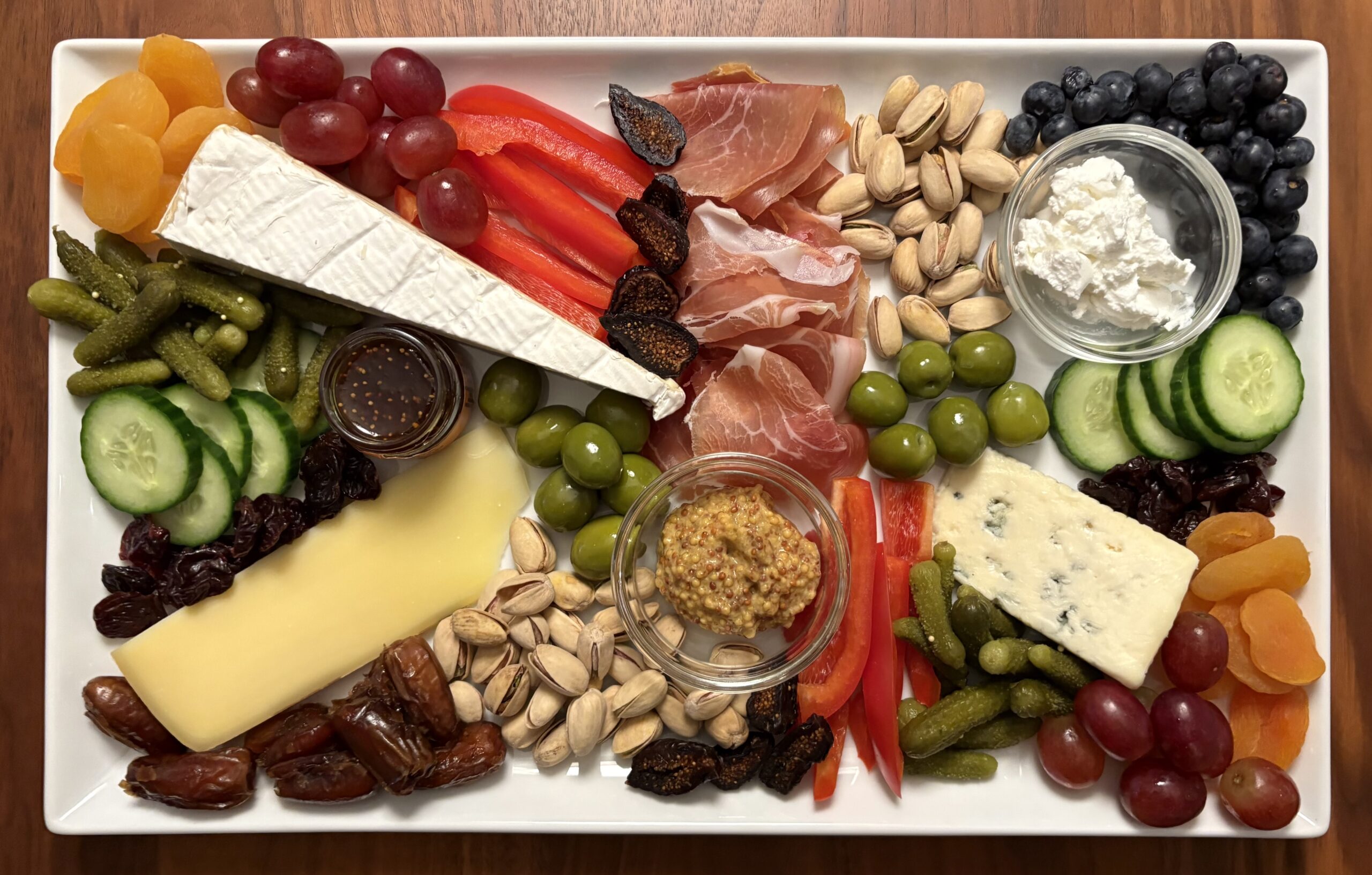This is the ninth edition of The 2 Susans, a monthly LinkedIn newsletter produced by Dr. Susan Baumgaertel and Dr. Susan Vogler.
We are two doctors who are curious about aging. Our newsletter embraces conversations about aging from many different perspectives—medical, psychological, societal and even personal. Of course we’ll have a lot of content that pertains to peri/menopause and beyond.
To read the December edition, click here. To read this new edition on LinkedIn, click here.
Enjoy the reprint below!
Food For Thought
Start the new year off on the right foot! In this edition Dr. Baumgaertel reflects on diets (a four-lettered word) and focusing on nourishment while Dr. Vogler reminds us about mindfulness as it relates to metabolic and weight support.
Susan B:
Nourishment for the New Year
Do the word pairings “nutritious eating” or “healthy foods” seem like fingernails on the chalkboard of your soul? To many who are trying to better manage their health they certainly can seem judgy.
This time of year—the start of a new year—it is easy to get caught up in resolution mantras. Suddenly everyone is doing Dry January, or is on a detox, or is “eating clean” (grammar be damned). Guilt and shame abound!
In our 24/7 fast-food culture, nourishment often takes a back seat when, in reality, it should be one of the most important aspects of eating. Our bodies are amazing, but they need the best fuel to work properly. Nourishing our metabolism can be accomplished in many ways:
🥦 Following low glucose, complex carbohydrate nutrition for prediabetes and diabetes
🥦 Considering low cholesterol content for hyperlipidemia and cardiovascular disease
🥦 Striving for anti-inflammatory foods for autoimmune and rheumatologic conditions
🥦 Aiming for reduced or no alcohol consumption for cancer risk reduction
There are so many variations on a theme, but the overriding message should be one of individual importance: Eat to maintain and improve individual health.
I’ve always said that the word “diet” is a four-lettered word. Far better to focus on nourishment instead: nourishment for our bodies, our minds and our souls. Instead of recommending specific diets, I advise my patients to think of some of the principles of certain diets and incorporate them into daily nutritional choices. Not surprisingly, the top three are Mediterranean, plant-forward, and whole foods.
Intermittent fasting can be included in the diet category simply because it can end up being quite punitive and easily-abandoned (like a diet) even though the principles are sound. This dovetails with prioritizing sleep because if sleep is poor, then time spent eating is most likely greater and many find their cravings get ramped up while their satiety is reduced.
From 2012 to 2019 I had the opportunity to guide patients on their weight management journeys in my Menu for Change wellness program. I worked collaboratively with a number of professionals, including physicians, naturopaths, dietitians, acupuncturists, psychologists, personal trainers and the like.
During this time period we had 80 lectures that supported health and wellness. One lecture that stands the test of time was given by Kima Cargill, PhD, Associate Professor of Clinical Psychology at the University of Washington and author of The Psychology of Overeating: Food and the Culture of Consumerism(Bloomsbury, 2015). Her talk was titled “Outsmarting Food Marketers: How to Use Reverse Psychology on the Food Industry” (2016).
Dr. Cargill spoke about the language food marketers use to give foods an illusion of health and how to reduce the allure of those “false promises of health” when navigating the grocery aisles. She also uncovered how food marketing and advertising affect our well-being and add to nutrition confusion.
Buying or growing food, planning and preparing a meal and enjoying the taste, smell and appearance of delicious food leads to individual nourishment in so many ways. Let’s all keep that front and center as the year begins anew.

Charcuterie board. Photo credit: Dr. Susan Baumgaertel.
Susan V:
Balancing the Scales
The holidays are laden with expectations – both self-imposed and societal. The pressure to meet social expectations can trigger anxiety, especially in environments where familial tensions exist or when individuals feel they must perform. As stress levels rise, individuals may seek solace in food, using it as a coping mechanism to dull emotional pain or distract from uncomfortable feelings. Typically, these food choices include high-carbohydrate, high-calorie, and sugary foods and treats. In this way, food serves as a source of emotional nourishment, aiding in managing feelings that emerge.
However, food is often deeply connected to memories and traditions. During the holiday season, many people associate specific foods with joy, positive experiences, and celebrations, which are part of the festivities. This nostalgia can create a strong emotional bond with food and intensify the desire to indulge. While these traditions often foster a sense of belonging, they can also lead to overindulgence as individuals seek to create those comforting experiences.
And now that it’s January, it’s time to focus on our goals in the new year. One of the more popular goals is weight management. As we grow older, this task becomes increasingly tricky as metabolism slows by 10% every decade; as a result, shedding those extra pounds requires more time and dedication than it did in our younger years. This challenge can be disheartening, but it also presents an opportunity for personal growth and a shift in mindset.
To navigate this journey more effectively, we can practice Mindfulness. Mindfulness involves being present now and recognizing our food cravings without judgment. Instead of automatically reaching for comfort foods during stressful times, we can redirect those urges toward alternative activities that provide fulfillment and joy. Engaging in hobbies, going for a walk, or engaging in an exercise routine you enjoy can all serve as a healthier outlet for stress and emotional fluctuations.
Reevaluating how we incorporate nourishment into our daily lives is crucial. It’s not just about restricting calories or following the latest diet trend. It’s about fostering a balanced relationship with food and exploring new nutritious recipes, learning about portion control, and being intentional about the foods we consume. Focusing on whole foods that nourish our bodies can create sustainable habits that support our long-term goals. Ultimately, the path to improved health in the new year is not just about the destination; it’s about embracing the journey.
Interested in learning more about Mindfulness? I would suggest the “Radio Headspace” podcast. Visit the Headspace website: Mindfulness to learn more.

Celebrating the holiday season at the Isabella Stewart Gardner Museum. Photo credit: Dr. Susan Vogler on December 4, 2024.
🗓️ Our February edition will focus on sleep.
📝💬 The 2 Susans would love to hear from you!
Let us know the aging topics YOU are curious about. Please also share this newsletter in your network and tag us—we are so grateful.
Susan B: susan@mymdadvocate.com
LinkedIn, myMDadvocate, MenopauseMenu, The Menopause Menu book
Susan V: susan@voglermedical.com
The 2 Susans newsletter is for informational purposes only. It does not represent medical advice and is not intended as a substitute for professional advice, diagnosis, or treatment. Always consult with your private physician.